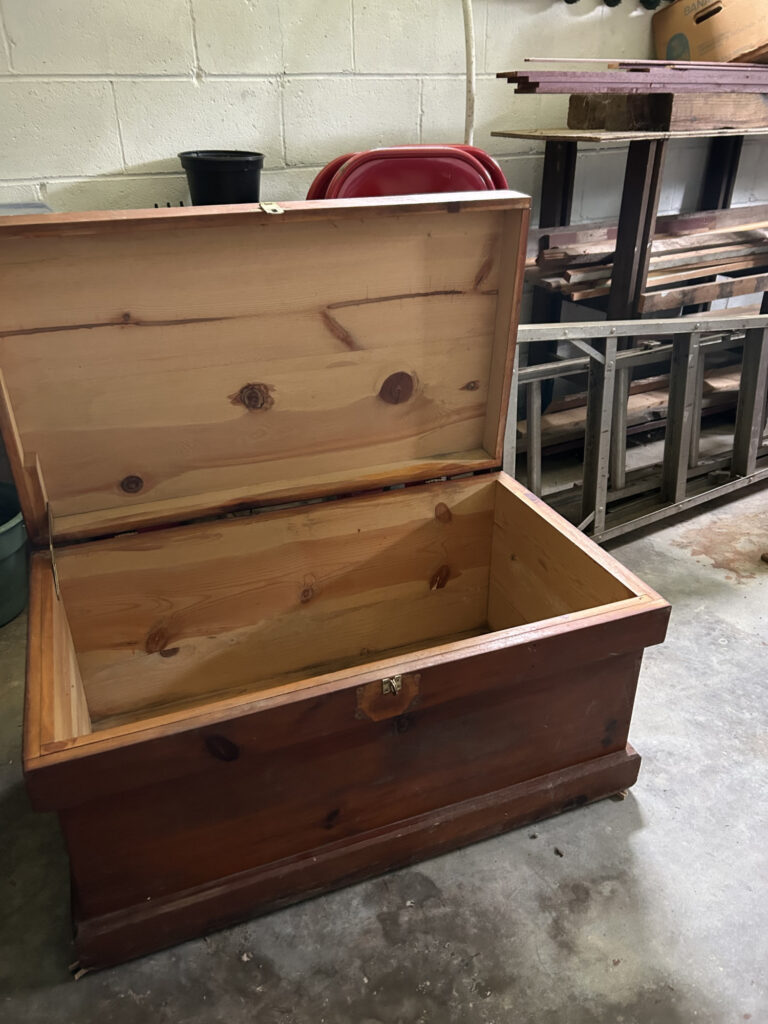Hidden Memories
In the middle of my workshop is my mom’s hope chest, a two-by-three-foot cedar chest. Long ago, she told me that as a young girl, this is where she saved embroidered tea towels and other things she’d need for her future married life. I doubt today’s young girls have hope chests. I certainly didn’t.
 I hadn’t thought of that chest in years, but it recently came back into my life after my brother’s death last October. First, I didn’t remember that Stan had it, and second, I’m unsure why he stored it at the back of a closed shed inside a pole barn on his creek-lined land. It was just recently discovered, and I’ve been sorting through the musty memories.
I hadn’t thought of that chest in years, but it recently came back into my life after my brother’s death last October. First, I didn’t remember that Stan had it, and second, I’m unsure why he stored it at the back of a closed shed inside a pole barn on his creek-lined land. It was just recently discovered, and I’ve been sorting through the musty memories.
In it are Stan’s keepsakes.
One photo album is filled with wide vistas of Lake Tahoe where he worked the summer between his freshmen and sophomore years at community college. Page after page of friends and lake and mountains speak of carefree fun. It was his first taste of life, independence, and adventure, and he spoke of it often as a place he’d like to return.
Also in the chest is the guest book from Stan’s wedding in New Jersey. That marriage lasted only ten years and he never got over it.
 I found a dozen cream pitchers carefully packed in that chest. My grandma collected over 200 pitchers. She had stuffed a note with name of gift giver and date inside each one. Obviously, Stan had picked his favorites, and most had his and his wife’s names on the gift note. I didn’t know he was that sentimental.
I found a dozen cream pitchers carefully packed in that chest. My grandma collected over 200 pitchers. She had stuffed a note with name of gift giver and date inside each one. Obviously, Stan had picked his favorites, and most had his and his wife’s names on the gift note. I didn’t know he was that sentimental.
We never really know a person, although saved treasures shine light on hidden emotions.
Mark Twain said it best. “What a wee little part of a person’s life are his acts and his words! His real life is led in his head, and is known to none but himself. All day long, the mill of his brain is grinding, and his thoughts, not those of other things, are his history. These are his life, and they are not written. Every day would make a whole book of 80,000 words — 365 books a year. Biographies are but the clothes and buttons of the man — the biography of the man himself cannot be written.”

Walt Rivers thought returning to his hometown to help his grandpa on the farm would be a quiet life after Force Recon missions, but when he turns on the radio, he hears a voice he would know anywhere. Twenty years have passed, but the memory of the one kiss he shared on graduation night with JoJo Lanagan, the most popular girl in school, has not faded. Now his mission is to win her.
JoJo watched him approach the table where she was broadcasting remotely from an auto dealership. Walton Rivers had left town as a quiet 18-year-old, but the Walton Rivers standing in front of her was a man. He had returned to their town with confidence, while she had returned whimpering and wary of men. Download your copy of The Voice on the Radio today!
Fourteen years have passed, but we will always remember That Sunday Afternoon.
Mike is playing ball at Ryan’s house when he gets a phone call from his mom, who’s at friends’ house, telling him to head home because of an impending thunderstorm. Normally he would have asked to wait the storm out at Ryan’s, but he still has homework and it’s already after five on Sunday afternoon. He rides his bike to his house and goes inside when the tornado sirens start screaming. He checks the local weather on TV and sees a giant funnel cloud on the TV tower cam before the electricity goes off. He and his sister run for the basement. Then everything changes. Although this novel is by definition fiction, the events of the F-5 tornado that devastated Joplin, Missouri, are very real. Get your copy today!
Travel back to small town life in 1954 to meet the people who live on the Corner of Pearl & Moffet.
Before 33-year-old Josie Jameson takes the seat reserved for the widow, she glances around the old graveyard. Over three hundred people have gathered to pay their respects to her late husband. That is nearly the population of Ducane, Arkansas.
She had married Orville nine years earlier. That he was 43 years her senior hadn’t really troubled her, but there had been plenty of talk. She was a farm girl when she married and moved to the big white house on the corner of Pearl and Moffet. She didn’t fit the mold of housewife to the richest man in town. Now that he’s dead, she owns the Ducane Savings and Loan, The Station that makes more money from liquor sales than gasoline, his private ledger books with unofficial loans and repayment schedules, and the little brown books written in his tight scrawl that hold the town’s secrets.
When tragedy strikes, the good people of Ducane, who share each other’s joys and sorrows, who celebrate others’ accomplishments with pride, who take food to the bereaved and do chores for those who are sick, these same good people whisper, “This is Josie’s fault!”
Corner of Pearl & Moffet is a gripping tale of one woman’s struggle through sorrow and challenges to find her own life. Download your copy today.
2025 essays
- June: Hidden Memories
- May: One of My Many Humiliating Moments or Is Honesty the Best Policy?
- April: Unfashionable
- March: Relying on Kindness
- February: I Procrastinated
- January: The Culprit
2024 essays
- December: A Christmas Gift for You
- November: Handbags and Crystals
- October: Kristofferson, The Poet
- September: The Hamburger Stand on Main Street
- August: Aunt Punch
- July: My Unpublished Letter
- June: The Last One
- May: Me? A Swiftie?
- April: My Old Job
- March: Her Silver Service
- February: From Start to Not Yet Finished
- January: Tossing Old Spices
2023 essays:
- December: What I’ve Learned So Far
- November: Indecision
- October: Esprit D’escalier
- September: Hearing the Birds
- August: Happiness is a Perfume
- July: Keep Smiling
- June: Spring Rituals
- May: I’ll Hitch a Ride
- April: The Jonquils
- March: Live in the Moment?
- February: Signs
- January: Resolution: Less Whining
2022 essays:
- December: Dorian Gray
- November: Ozark Seasons
- October: The So-Called Never-Fail No-Risk Plan
- September: An Unwelcome Souvenir
- August: The Gate to Nowhere
- July: The Land Line
- June: Don’t Call Me
- May: Who’s To Judge?
- April: Time Changes
- March: The Queen of England
- February: A Bit of Chaos
- January: Headlines!
2021 essays:
- December: The Junk Drawer
- November: Keep Your Fork
- October: Write Your Life
- September: Sleeping on the Floor
- August: Life on the Mississippi or What I Learned on My Summer Vacation
- July: Jerry Stamm
- June: A Trying Time or Replacing the Mattress
- May: The Pace
- April: Learning From a Past Mistake
- March: Attitude Change Needed
- February: I Am an Eagle
- January: What Next?
2020 essays:
- December: Old Ornaments
- November: Period.
- October: On One Condition
- September: Capturing Sunshine
- August: Baseball’s Return
- July: They Bug Me
- June: Coincidence or Mysterious Connection?
- May: Spontaneity
- April: The Paints on the Wall
- March: The Signature Sandwich
- February: The Dream Catcher
- January: A Random Act of Kindness
2019 essays:
- December: Raking the Leaves
- November: Reflections in the Mirror
- October: Pioneer Woman
- September: Rewinding
- August: The Last One
- July: Nice People
- June: Jeopardy
- May: Playing
- April: Seeing the World
- March: The Signature
- February: So I Went
- January: NOW do it
2018 essays:
- December: Eureka!
- November: Morning Ritual
- October: The Hard Part
- September: Walking in the Dark
- August: Old is New Again
- July: Change Orders
- June: Country Songs
- May: Scars
- April: This Old Place
- March: Wearing a Robe
- February: A New Adventure
- January: Another Year
2017 essays:
- December: Beginning a Hiatus
- November: A Name
- October: Of Course, I’ll Use the Grand Canyon or How I Spent My Summer Vacation
- September: I Packed Courage, Too
- August: Nothing Dangles From My Rearview Mirror
- July: Grandma Brown’s Desk
- June: Old Paint
- May: Dandelion Yellow
- April: Cleaning Out Our Past
- March: The Flames of Cheer
- February: The Color of Oklahoma
- January: Former Cars
2016 essays:
- December: The Stocking Conundrum
- November: Comfort from a Cup of Tea
- October: A Friendly Wave
- September: Why Are First Memories Bad Ones?
- August: How to Treat a New Widow
- July: My Outrage or A Warning to Women
- June: Rock Collections
- May: May Baskets
- April: Screen Doors
- March: Hiraeth
- February: My New Key
- January: My Book Clubs
2015 essays:
- December: The Real Santa
- November: Mrs. Coker’s Lamp
- October: Life’s A Holiday
- September: School Reunions, a.k.a. Looking Forward to the Past
- August: Risk
- July: Old Shoes
- June: The Ant Invasion
- May: Goodbye to the Sailboat
- April: A Rant
- March: Sharing Joy
- February: On Reading Aloud
- January: The Lesson of Chicken Pot Pie
2014 essays:
- December: The Scent of Christmas
- November: Life Markers
- October: Forgiving Myself
- September: I Won’t Change It
- August: Back in Time and Looking Forward
- July: Changes
- June: The Napkin Controversy
- May: On Being Overwhelmed
- April: A Time for Everything
- March: Washing the Car
- February: Drowning
- January: Who Will Live in My House?
2013 essays:
- December: The Recipe on the Refrigerator
- November: The Lean
-
October: Washing Windows
-
September: Memories of Music
-
August: Leap Before You Look
-
May: The Hidden Garden
-
April: The Day Before April
-
March: My Favorite
-
February: The Safety Net
-
January: The Friendship House
2012 essays:
- December: Do I Have a Small Mind?
- November: The Wonders Around Us
- October: Gaining Knowledge
- September: Respecting Others’ Beliefs


